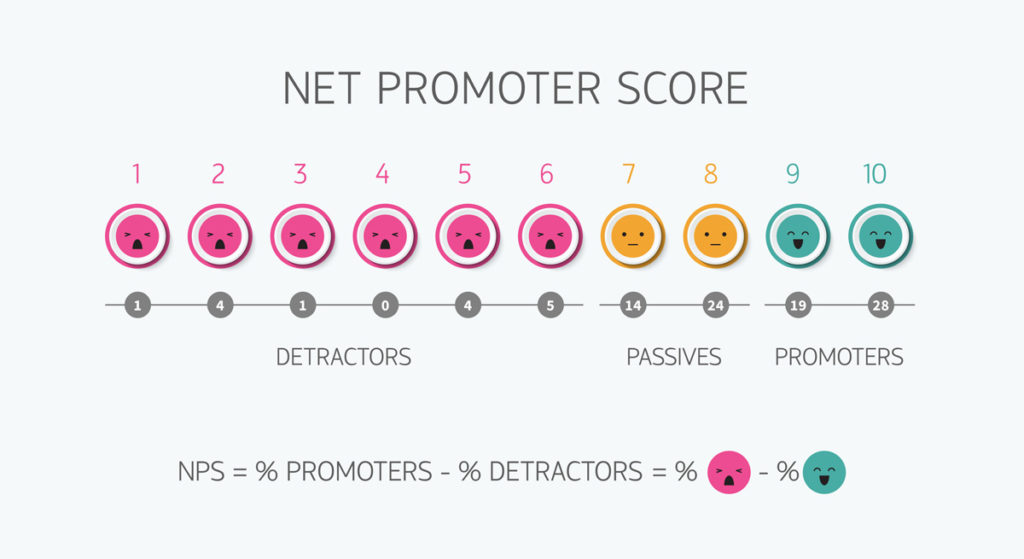The Net Promoter Score (NPS) measures customers’ propensity to recommend a company (word-of-mouth). NPS is not intended to measure customer satisfaction. Yet that’s how it continues to be used. Research confirms that NPS correlates well with customer satisfaction. However, this should clarify the limitations of NPS, which we discuss at the end of this article.
Entrust us with your customer satisfaction surveys
Imagine how much easier it is to measure customer satisfaction with Net Promoter Score. All you must do is ask a question, and you’ll know immediately whether your customers are satisfied. Too good to be true? Well, that’s what research conducted by Haans and Roossens (respectively, Tilburg University and Eindhoven University, Netherlands) set out to find out. The results were presented at an EMAC conference. We explain them to you in this article and end by pointing out the limitations of the scale.
An 11-point scale for differentiating attitudes
The scale is extremely easy to apply. We use it every time we conduct customer satisfaction research. As an example, we recently applied it successfully to measure the satisfaction of an IT services company present in over 10 countries. In contrast to this reasoned use, however, we have also observed several abuses.
As a reminder, the principle is simple. The question is: “How likely are you to recommend company X to friends and family?” The answer is measured on a scale from 0 to 10 (0 corresponding to “I would never recommend this company” and 10 to “I would always recommend this company”).
- Customers answering between 0 and 6 are called “detractors,” as they are thought likely to spread negative word-of-mouth.
- Customers who answered 9 or 10 are called “promoters,” as they are thought likely to spread positive word-of-mouth.
- Finally, customers who answered 7 or 8 are said to be “passive,” as it is thought that they will not take any action against or in favor of the company.
The question to be answered is this. Is it true that scores below 6 will generate negative word-of-mouth, while scores above 9 will lead to positive word-of-mouth?

Are NPS scores dependable?
Haans and Roossens’ research aims to verify the link between NPS scores and recommendation behavior. Their methodology is as follows:
- First, the authors obtained NPS scores and e-mail addresses from customers of two large companies in the Netherlands.
- Next, they systematically examined any online comments posted by these customers.
- Finally, they assessed the customers’ comments on a simple scale (positive, neutral, negative).
All that remained was to measure the correlations between the original NPS scores and the online comments.

Net Promoter Score accurately reflects customer recommendations
The results are remarkably interesting:
- Detractors do not differ in their behavior from one to another
- Promoters differ from other groups but are similar to each other
- Passive customers display heterogeneous behaviors
This means that the detractors and promoter groups are customers with homogeneous behaviors (negative on one side, positive on the other). For example, 70% of detractors give negative comments and spread negative word-of-mouth.

The limits of the Net Promoter Score
We have already discussed the limits of Net Promoter Score in detail in an article. 2019 research has also clearly identified them. It’s worth reiterating them here to temper the enthusiasm the above results might trigger.
Lack of visibility on improvement levers
The NPS does not provide data on specific actions to be taken to improve the customer experience. It indicates the proportion of customers likely to recommend a company without explaining the reasons for their loyalty or dissatisfaction.
Focus on Customer Retention
NPS focuses primarily on retaining existing customers rather than acquiring new ones. This is a potential limitation for growth-stage companies that must expand by conquering new market segments.
Lack of comparative data
The NPS does not provide comparative data that would enable companies to position themselves concerning their competitors, which is crucial to developing effective strategies in a competitive market. An online survey of non-customers can solve this. It is necessary to consult survey institutes, who will then use a panel.
Limits to the data collected to achieve this
The data generated by the NPS are the result of a declaration. They are not observed. There is, therefore, no guarantee that the response provided by the customer is dependable or that it can identify the root causes of problems.
Cost and complexity
NPS can be an expensive and complex exercise, requiring in-depth collection and analysis of customer data.

Should you use Net Promoter Score or not?
NPS is indeed a good indicator in most cases. It accurately describes customers’ negative and positive behaviors recommending (or not) a company.
However, it fails to predict the behavior of passive customers because this segment is too heterogeneous.
Our recommendation is to be careful when analyzing your customer satisfaction results. Bear in mind that passive customers can also spread negative word-of-mouth. Logically, therefore, you should focus first on customers who rate your company poorly (0 to 6), then personally check the perception of passive customers. This will ensure you notice all unhappy customers when developing your strategy to increase customer satisfaction.
If you’d like to improve customer satisfaction, don’t hesitate to contact one of our experts. Send us a message, and we’ll reply within 60 minutes.
Posted in Marketing.
